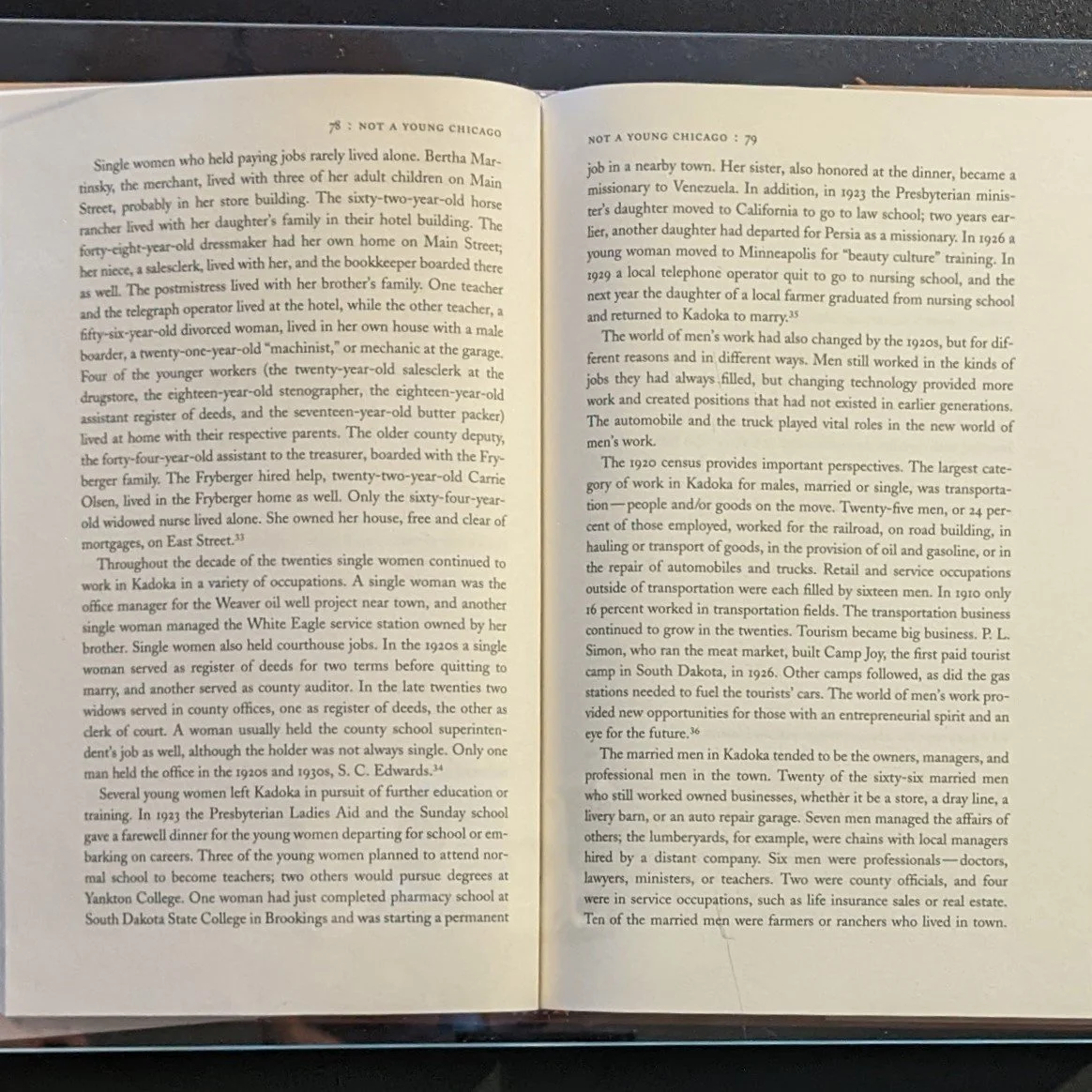 Image 1 of 3
Image 1 of 3

 Image 2 of 3
Image 2 of 3

 Image 3 of 3
Image 3 of 3




The Prairie Winnows Out its Own
The Prairie Winnows Out its Own - The West River Country of South Dakota in the Years of Depression and Dust by Paula M. Nelson
My father told a tale, more like a fable, of conversations between farmers moving west during the 30’s and the local gas station attendant. The first family lamented that they hated to leave because they will miss their neighbors. The attendant comforted them with a simple reply - you will find that people are pretty much the same wherever you go. The second family lamented that they had to leave because the land could not support them, but they were glad to leave behind the neighbors (add unseemly words). The reply - you will find that people are pretty much the same wherever you go.
This book tells the stories of South Dakota farmers in the lands west of the Missouri River. The word submarginal, which I had heard often as a child, referred to land that, let’s say, could be farmed on a good year. Indeed, Faith, South Dakota - named for Faith Rockefeller - was a hub for early settlers and the terminus of a spur of the Milwaukee Road Railroad, and fell solidly into that category. Ironically, you must have Faith to live here through tough times. Settlers arriving between 1900 and 1915 faced a severe drought in 1910, economic collapse after WWI, and then of course, the Great Depression of the 1930’s. This is their story.
Hardcover with jacket - Like new
The Prairie Winnows Out its Own - The West River Country of South Dakota in the Years of Depression and Dust by Paula M. Nelson
My father told a tale, more like a fable, of conversations between farmers moving west during the 30’s and the local gas station attendant. The first family lamented that they hated to leave because they will miss their neighbors. The attendant comforted them with a simple reply - you will find that people are pretty much the same wherever you go. The second family lamented that they had to leave because the land could not support them, but they were glad to leave behind the neighbors (add unseemly words). The reply - you will find that people are pretty much the same wherever you go.
This book tells the stories of South Dakota farmers in the lands west of the Missouri River. The word submarginal, which I had heard often as a child, referred to land that, let’s say, could be farmed on a good year. Indeed, Faith, South Dakota - named for Faith Rockefeller - was a hub for early settlers and the terminus of a spur of the Milwaukee Road Railroad, and fell solidly into that category. Ironically, you must have Faith to live here through tough times. Settlers arriving between 1900 and 1915 faced a severe drought in 1910, economic collapse after WWI, and then of course, the Great Depression of the 1930’s. This is their story.
Hardcover with jacket - Like new
The Prairie Winnows Out its Own - The West River Country of South Dakota in the Years of Depression and Dust by Paula M. Nelson
My father told a tale, more like a fable, of conversations between farmers moving west during the 30’s and the local gas station attendant. The first family lamented that they hated to leave because they will miss their neighbors. The attendant comforted them with a simple reply - you will find that people are pretty much the same wherever you go. The second family lamented that they had to leave because the land could not support them, but they were glad to leave behind the neighbors (add unseemly words). The reply - you will find that people are pretty much the same wherever you go.
This book tells the stories of South Dakota farmers in the lands west of the Missouri River. The word submarginal, which I had heard often as a child, referred to land that, let’s say, could be farmed on a good year. Indeed, Faith, South Dakota - named for Faith Rockefeller - was a hub for early settlers and the terminus of a spur of the Milwaukee Road Railroad, and fell solidly into that category. Ironically, you must have Faith to live here through tough times. Settlers arriving between 1900 and 1915 faced a severe drought in 1910, economic collapse after WWI, and then of course, the Great Depression of the 1930’s. This is their story.
Hardcover with jacket - Like new
Publisher : University Of Iowa Press (December 1, 1996)
Language : English
Hardcover : 276 pages
ISBN-10 : 0877455252
ISBN-13 : 978-0877455257
Item Weight : 1.3 pounds
Dimensions : 6.5 x 1 x 9.75 inches